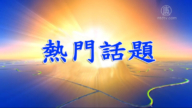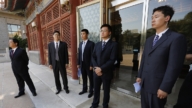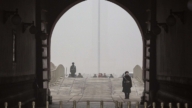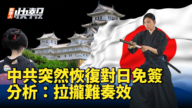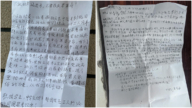【新唐人2014年09月17日訊】蘇格蘭獨立公投進入倒計時。18號,蘇格蘭境內16歲以上的居民將選擇「是」或「否」,來決定蘇格蘭是否要脫離英國,成為一個獨立的國家。目前,統獨兩派的民調支持率非常接近,最後結果如何,恐怕要等公投揭曉後,才會知道。有外國媒體指出,蘇格蘭獨立公投引發中共執政者的擔憂。為何會這樣呢?請看報導。
英國《金融時報》9月16號的報導指出,中共當局的噩夢之一就是:資源豐富的半自治省份的民眾,就獨立舉行投票。中共將不會容忍少數民族,或普通老百姓談論自決的問題。報導說,中共高層正帶著疑慮,關注著蘇格蘭的民主活動。
《路透社》發自北京的報導說,由於面臨西藏、新疆、台灣民族自治,或領土主權等難題,蘇格蘭民族自決的方式,引發中共執政者對本國民族問題和政局前途的擔憂。
報導指出,中共官方至今仍然以蘇格蘭公投是英國內部事務為由,拒絕發表正式評論。
旅美中國社會問題研究人士張健:「中共其實並沒有表態,因為如果它反對的話,它反對的是一個普世價值,是反對人的一個對自己國家選擇的自主權﹔如果它同意的話,它又怕將來在中國的問題上,如新疆問題、西藏問題以及其他等等問題,也都會產生這樣一個連鎖的效應。」
中共官方媒體發表了一系列社論,警告蘇格蘭民族主義的危險。如中共喉舌《人民日報》旗下的《環球時報》,刊文宣稱,如果沒有蘇格蘭,英國將從世界的二流國家,進一步淪為歐洲的二流國家。
文章還說,蘇格蘭獨立運動告訴人們,像英國這樣的老牌發達國家,遠沒有想像的那樣穩定。
中國憲政學者陳永苗:「像《環球時報》或者是中共的喉舌,擔心這個國際問題帶來的影響,對中共政權本身帶來了一個摧毀性的作用。比如說在蘇格蘭公投上,它會看到新疆的問題,或者西藏的問題,或者香港的問題,所以它不斷的在這些問題上,不斷的影射,告訴你們說,這個公投不好啊,會影響社會穩定啊!」
香港的中國問題專家林和立向《金融時報》表示,中共當局擔心,不安定省份的民眾,可能會從蘇格蘭的獨立訴求中獲得啟示,並產生他們自己的想法。
張健:「對中國的老百姓可能是徹底的顛覆性的看法,因為在我們過去認為,當一個地區脫離開一個國家之後,它的人民必將是不幸福的。蘇格蘭這個公投事件其實也是反洗腦的一個活生生的教科書,對中國民眾最大的啟示就是,你可以選擇自己的國家,你可以選擇自己的政府,你也可以有自由加入任何政黨、信仰宗教的權利,這個方面是最鮮明的起到一個教育作用。」
中國憲政學者陳永苗認為,蘇格蘭公投對中國會有文化和社會上的影響,但不會有政治上的影響。
陳永苗:「像處理新疆問題,它不可能在中國的媒體或者網絡上大張旗鼓地談新疆問題,它可以大張旗鼓地談蘇格蘭的公投,但是它心知肚明的,實際上它是藉蘇格蘭公投的酒杯來澆自己心中的塊壘,香港這麼自由的地方,本來是可公投的地方,他們『佔中』也只能搞公投的模擬吧!」
旅美中國政治學者王軍濤向《自由亞洲電臺》表示,近年來發生在新疆的暴力事件、西藏的自焚、台灣的「太陽花運動」,以及香港的「佔中」,都顯示北京當局難以維繫民族團結,或者國家統一,其中原因與中共在政治上專制,以及對社會的「維穩」控制政策,有著直接的關係。
張健:「只要共產黨執政一天,它不可能在公投的問題上有任何鬆口,連個選舉權都不能實現的國家,怎麼可能有公投的權利。」
王軍濤指出,鄧小平時代開啟的所謂「改革開放」,也曾希望藉助經濟的發展,使民族矛盾和地區分裂主義得以消除。但事實證明,由於現行體制導致的發展成果分配不公,中國的民族和政治矛盾反而變得日趨緊張。
採訪/田淨 編輯/陳潔 後製/陳建銘
Scottish Independence—Why the CCP’s Concern?
It’s countdown to the Scottish independence referendum—
On Sept. 18, Scotts over 16 will vote to decide whether
Scotland will become an independent country.
Poll ratings for unification and independence
are currently said to be very close.
Some overseas media say the independence referendum has
triggered concern for the Chinese Communist Party (CCP).
The British Financial Times reported on Sept. 16 that
the CCP is deeply concerned that people in resource rich
and semi-autonomous Chinese provinces
will hold a referendum for independence.
The CCP does not tolerate anybody talking about
self-determination; senior CCP officials are watching
the democracy event in Scotland with concern.
Facing territorial sovereignty and other problems in Tibet,
Xinjiang and Taiwan, the activities in Scotland have hit
a sore spot for the CCP over its own ethnical issues
and political future, reported Reuters from Beijing.
Reuters say CCP officials are refusing to make any formal
comment, saying the Scottish referendum is UK’s affair.
US-based researcher, Zhang Jian: “The CCP have not
commented—if it opposes it, it is opposing a universal value,
a person’s choice for their own country; if it agrees with it,
it’s afraid of a chain reaction in Xinjiang, Tibet, etc.
Some of the CCP’s official media have published a series
of editorials warning of the dangers of Scottish nationalism.
An article claiming that, without Scotland, UK will drop
from being a world second-rate country to being second-rate
in Europe, was published by The Global Times—a paper
owned by the CCP mouthpiece media, People’s Daily.
The article says the Scottish independence movement
proves that UK is less stable than people imagine.
Chinese constitutional scholar, Chen Yongmiao:
“The CCP’s media such as Global Times worries that
the Scottish referendum is devastating for the CCP,
because it can impact Xinjiang, Tibet and Hong Kong (HK).”
“So they constantly say this referendum is bad,
that it will affect social stability."
A China expert from HK Willy Wo-Lap Lam says
the CCP authorities fear that people in unstable provinces
may take inspiration from Scotland seeking independence.
Zhang Jian: “Chinese people may see this act as being deeply
subversive; we’ve been made to believe that when an area
withdraws from a country, those people become unhappy,
so this Scottish event is like an anti-brainwashing event."
“It’s a great revelation to Chinese people that one can choose
his own country, his government, his religious belief,
and have freedom to join any political party—
this is a most distinctive education."
Chen Yongmiao says the Scottish referendum will impact
China’s culture and society, and have political implications.
Chen Yongmiao: “It’s like when handling the Xinjiang issue,
the CCP won’t talk extensively about this referendum
on media or the internet, as it’s well aware of the impact
the Scottish referendum can have on the Chinese people.
“Hong Kong is an area of freedom; it’s movement of
“Occupy Central" is only simulating a referendum."
US-based Chinese political scholar, Wang Juntao says that
violence has erupted in recent years in Xinjiang, there are
self-immolations in Tibet, Taiwan’s “Sunflower Campaign",
and the “Occupy Central” movement in HK—these all reveal
that Beijing is having difficulties maintaining unity.
One direct reason is the CCP’s political tyranny
and its tight control to “maintain stability".
Zhang Jian: “While the CCP is in power, it’s not possible
to have a referendum; there’s not even the right to vote."
Wang Juntao says the so-called “reform and opening"
during the Deng Xiaoping era was to remove ethnic conflicts
and regional separatism through economic development.
But it caused increasingly tense ethnic and political conflicts
and the current system has led to unfair wealth distribution.
Interview/TianJing Edit/ChenJie Post-Production/Chen Jianming


